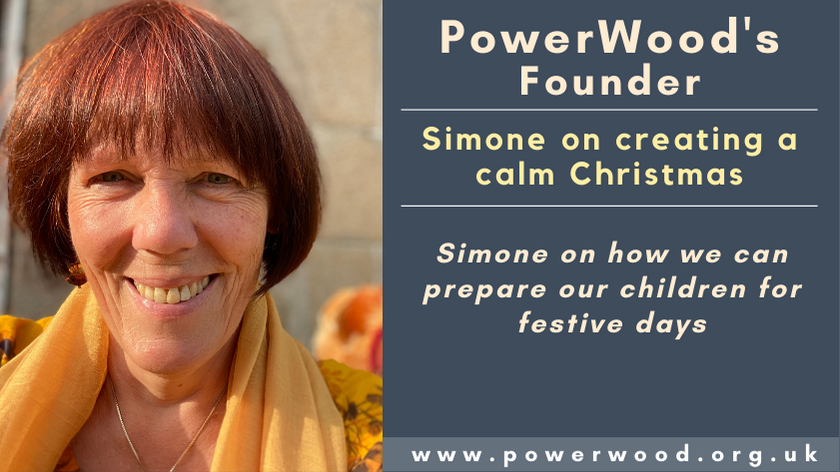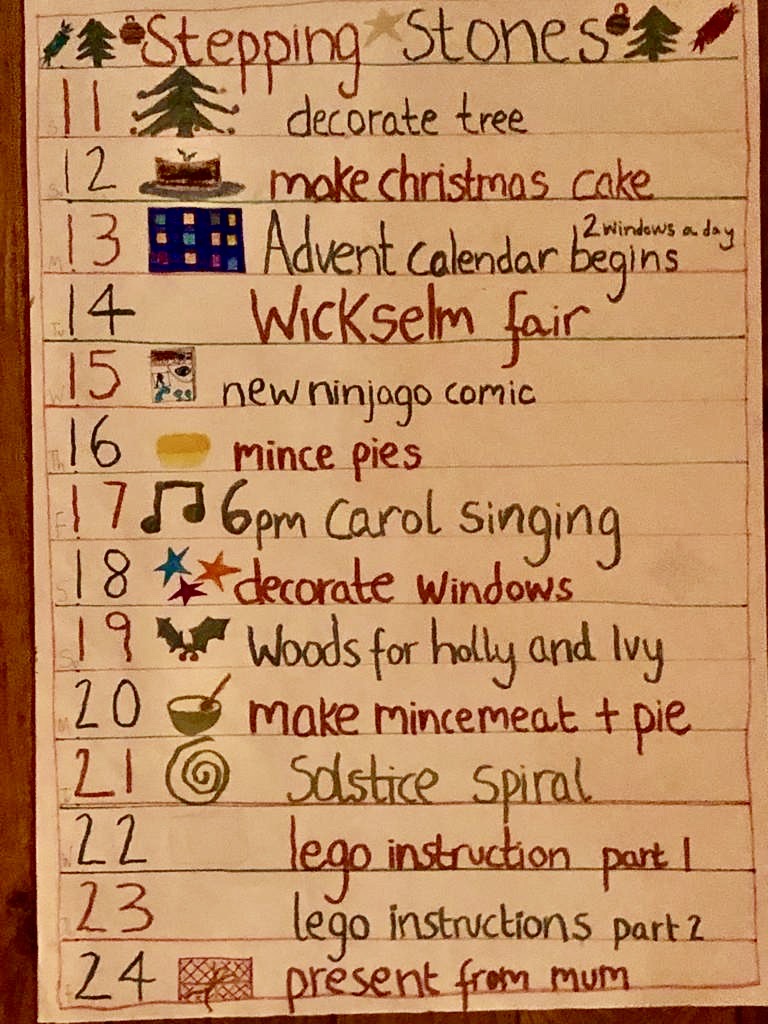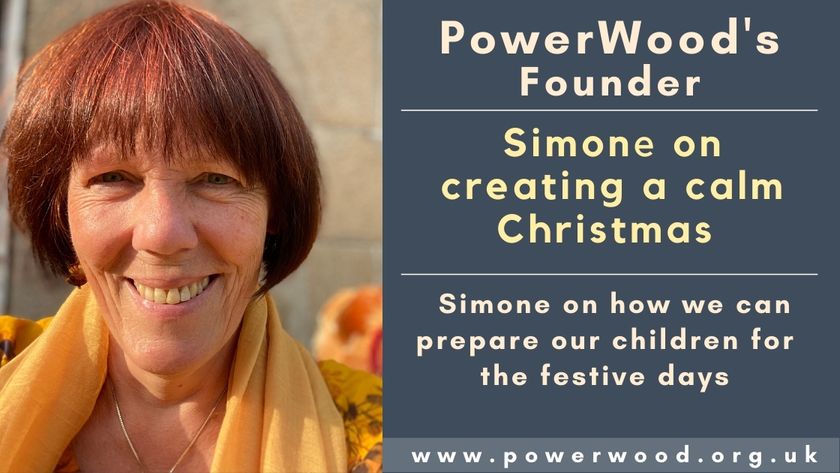
Each year when our daughter was young, the carefully crafted balance in our family always started to go pear-shaped around November.
As soon as the Christmas displays started to appear in the shops, it would have a huge impact on the emotional wellbeing of our daughter and fuel her deep longing for things she didn’t have yet.
When really young she stopped sleeping through the night, becoming restless and anxious, and ruthlessly questioning us about Sinterklaas (the Dutch variety of father Christmas). She sensed something was off, asking us how his helper was able to throw little presents down all the chimneys at the same time. She made plans to stay up all night to see how he did it (luckily falling asleep so we could carry her to bed) and questioned us relentlessly on how they knew if she had been a “good” or a “bad” girl. Worrying if she had been a “bad” girl and therefore not going to get any presents, she gnawed her fingernails until they bled.
Neither was she able to cope with not knowing what she was going to get, nor did she display the appropriate reactions (being grateful) when receiving gifts.
How we can prepare our children for Christmas
Clarity
Taking the anxiety-triggering sting out of the Christmas event. We gave her closure at a very young age… We told her that both Sinterklaas and Father Christmas did not really exist, that they were just figures based on historic events and now used by shops to sell more toys to make more money. It was just us, her grandmas and other family members who gave her presents and it had nothing to do with whether she was a “good” or “bad” girl.
Anxiety or Excitement
We also explained that she couldn’t tell her cousins or the other children in the village that Sinterklaas and Father Christmas didn’t exist. We talked about how some other children experienced the excitement around Father Christmas differently and that it didn’t trigger their imagination as it did hers and the consequent anxiety, so it would spoil their fun if they were told he wasn’t real. She never spoke about it, which was a small miracle as she was very chatty.
Disclosure
She was unable to cope with not knowing what presents she was going to get, searching the house to see if she could find any hidden presents and continuously questioning us about what we were going to give her. Stress would build up and her resilience would be so low that she would blow up very easily over small changes or become very unhappy or argumentative.
In the end we decided to tell her what she was going to get. We would also give her some surprise presents to help her learn how to deal with the unexpected. Some were received gracefully whilst others were rejected very impolitely, even in anger.
During the years she managed to grow more grateful to her grandparents even if she didn’t like the present, which we thought was a huge achievement knowing how stress provoking the whole situation was for her.
Baseline
To prepare the children for an emotionally challenging event we can strengthen their baseline, their energy level and emotional resilience, by setting the cuddle alarm, if they like cuddles, every time when they speak to us, stop with what we are doing and look up with a welcoming smile on our face.
Releasing tension
Like cats, dogs, and kangaroos, we humans also like play-fighting.
Play fighting gives children the chance to grow (spatial) awareness about their and other’s bodies and their bodily reactions or expressions of emotional inner turmoil. It raises their oxytocin level, therefore raising their feeling of connection, and allows for experiencing deep pressure in a safe environment.
When fathers or mothers play fight with their children, they are considerate and adept at the strength of their play to the strength of the child, and are compassionate about having a joyful time with their child.
Children will experience being on the losing end and feel safe in the knowledge that their father or mother is in fact regulating their own emotions and won’t hurt them, even if they make an unexpected movement that hurts their parents.
At a certain point, as teenagers, they will become stronger than their parents, and they will return the favour, showing that through modelling they have learnt to regulate their physical and emotional reactions as well.
It will also grow the bond between parent and child through oxytocin, the bonding hormone.
If physical violence is a trigger or makes you feel uncomfortable, don’t overstep your boundaries, you might consider asking your partner or another family member to share this experience with the children.

Social events
We would spread all social events over a few days, with only one social event per day, and that included our brunch, to prevent building up of tension.
We also took walks where we would run after the children, play catch and seek. And we would collect natural things e.g. moss, cones, acorns, leaves, branches etc. to decorate the table and the room for Christmas.
Predictability
We were very clear on what would happen and when, so it was crystal clear to our daughter what to expect, and when she asked, we had a very clear repetitive (kind voice) answer.
For example:
Sunday we are going to set up and decorate the tree and visit Gran Jacqueline.
Monday afternoon we are going to set the Christmas eve table and decorate the room with Christmas decorations and sing songs, and before it is dark we are going for a walk.
After that (or whenever we the parents think the tension is getting unhealthy) we can pick one present to unpack (for the young ones and the highly challenged).
Monday evening on Christmas eve, we will join around the table, and we will be having our Christmas eve snack (typical Dutch worstenbroodjes) and a glass of sparkly apple juice with afterwards an extra story before bed.
On Christmas day we will have brunch, and in the morning we are laying the table and decorating the table.
Christmas Stepping Stones
This is an example of a mum who offers visual predictability to her child.

Appropriate to their ability
Dependent on their (emotional and mental;) age on Christmas day we moved from
-You can unpack all the presents as soon as you wake up on Christmas day to
-As soon as you wake up you can pick out a (second) present to unpack, and in between each course of the Christmas brunch and dinner they could bring all of us a new present to unpack until they are finished. This way trains our children to postpone gratification.
Will it get easier?
Even when our now adult daughter was twenty years old she pleaded jokingly to be allowed to open a present before Christmas Day. Of course we ended up opening one each the evening before. Only one though, which she happily lived with, as did we.
Have a lovely Christmas!
© 2022 Simone de Hoogh, senior coach and consultant, and founder of PowerWood. All posts by Simone de Hoogh
Help us to continue support to all neurodiverse families and individuals
PowerWood offers to neurodiverse families understanding, simple tools and strategies that enable us to support ourselves and our children through emotional overwhelm. If you enjoy reading the articles please support PowerWood making all information available to all by becoming a PowerWood Community FreeBee or Friend member. Thank YOU!


